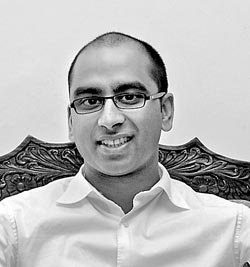
Feeling foreignRandy Boyagoda, a Sri Lankan-Canadian professor of American Literature at the Ryerson University, Toronto reflects on the world of immigrant fiction In most interviews, one of the first questions that Prof. Randy Boyagoda finds himself fielding is “are you African?” He is not, even though his book, The Governor of the Northern Province, is about an African warlord who makes a new life for himself in modern Canada. In fact, Prof. Boyagoda, currently a professor of American Literature at Ryerson University, Toronto, is a Sri Lankan-Canadian, born and raised in the small town of Oshawa. He reveals that he doesn’t particularly appreciate being asked that question, not least because, eventually and invariably, he is then required to explain his ethnicity and “to account for the evident disparity between that ethnicity and the subject matter of my novel.” “The question carries with it implications that, however unintentional are nonetheless unsavoury, about what a hyphenated novelist is expected to write about in the West these days,” said Prof. Boyagoda in a lecture delivered at the International Centre for Ethnic Studies last week on “Living and Writing along the Hyphen: the Cultural Politics of Immigrant Fiction.” Over the course of the 20 minute lecture, he discussed books like the “The Reluctant Fundamentalist” and “The Bastard of Istanbul,” as he elaborated on his belief that much of the current fiction written by immigrant writers in the West is read because these books serve multiple functions. Reading a book by an immigrant writer “demonstrates respectability, shows almost a form of contrition if you will and finally and most importantly, it is authentic, somehow,” he said.
Many of the novels in question are marked by their painfully clichéd plots and characterisation. “It involves someone from a different country who comes here, doesn’t fit in, and doesn’t fit in back home,” says Prof. Boyagoda blithely, describing a typical plot. The plot would then have that person discover an authentic recipe provided by a suitably ancient grandmother. Unfortunately, the knife slips and cuts the protagonist while he attempts to recreate this most authentic of traditional dishes. Sucking on his finger, he tastes his own blood. “He has a flashback….it’s bitter sweet, The End.” “What’s promised by these books is not simply a good story but a good story peppered with foreign words, distant locales, and righteous depictions of global and local injustices, hopefully tons of references to exotic food…a good story that manages to challenge and comfort at the same time, much like an all you can eat buffet at an Indian restaurant,” says Prof. Boyagoda wryly. In their pursuit of just such an “authentic” experience, readers will often consider the author’s lineage of more account than the actual calibre of the author’s writing. “Why is it that as a culture we want to know what a writer personally thought of events that he wrote about in fictional terms?” asks Prof. Boyagoda, adding, “how and why did this answer affect the basic literary merit of the work he has created? One wonders in short, if anyone ever asked Dante if he went to hell before he wrote The Inferno.” Prof. Boyagoda’s own first novel – a finalist for Canada’s top award for fiction, the Scotiabank Giller Prize – sprang not from a visit to Africa, but from a fleeting reference to a disco dancing African warlord in a newspaper article. The warlord in question was notorious for his brutality, his passion for chopping the limbs of women and children, and his inscription of child soldiers. “And in passing the article mentioned that before he became a warlord, Bokarie was a professional disco dancer,” says Prof. Boyagoda. “I remember thinking, how can one make sense of something like this? I tried to do that by putting him in a small town in Canada. What would he make of them and what would they make of him?” He has already begun research on his next novel to be set in Sri Lanka. No stranger to the island, Prof. Boyagoda has visited family and friends here several times in the past. On his return to Canada, he will be writing an article for Harpers Magazine about life in contemporary Sri Lanka. It will be one of numerous articles, literary criticisms, papers and opinions authored by Prof. Boyagoda for both Canadian and US periodicals, including “The Walrus”, “The National Review” and “The New Pantagruel”. |
|| Front
Page | News | Editorial | Columns | Sports | Plus | Financial
Times | International | Mirror | TV
Times | Funday
Times || |
| |
Copyright
2007 Wijeya
Newspapers Ltd.Colombo. Sri Lanka. |
